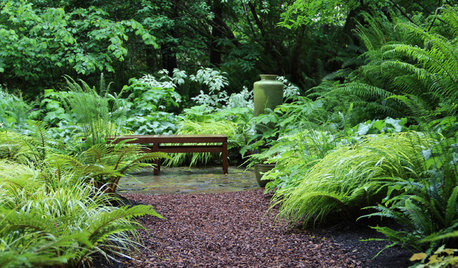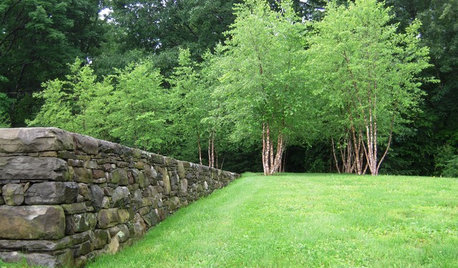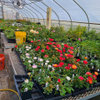Getting good soil for new garden beds
matthewbrendan
8 years ago
last modified: 8 years ago
Featured Answer
Sort by:Oldest
Comments (22)
matthewbrendan
8 years agoRelated Discussions
Good garden soil makes poor soil for roses in containers?
Comments (42)The reason you can't trust the volume of nursery pots, Jim, is that those black nursery containers are all "nominal" sizes. That means the volume of the pots is vaguely related to the stated gallon size. A "5 galllon" nursery can is 10.5 in. diameter and 12 in. tall. My online calculator says that is only 3.75 gallons if you pot 2 inches from the top of the pot. That isn't large enough for any rose past the first year or so if it puts on vigorous growth. The foot stomping is an old landscaper practice. It's just a cheap way of determining settlement without taking the time to water a plant in. I wouldn't do it. Water your plant in to settle the soil. I've seen people planting roses into dry potting soil. I wouldn't do it. Many potting soils have peat moss which sheds water once dry. Those of you in climates with steady rain year round may not have this problem, but in the desert West, once peat dries out, it takes a concerted effort to dampen it. I open the bag of soil, stick the hose in, fill it up and mix. Then I pot with dripping wet potting soil and also water it in. It's mud pies for grownups. It assures that the soil comes to the optimal height in the pot (about 2 inches down) and fills major air pockets. I unpot roses all the time and have never found an air pocket. I don't drop pots on purpose. Our summers are too hot to grow a lot of roses in pots well. We can't keep the roots cool enough through June and July. I overpot extensively. A 3 x 3 rose goes in an ornamental pot that is 22-24 inches high. I use various decorative pots from the big box store and always buy the biggest size. Why? They bring to rose up to height and look more in scale with a landscape. It's funny how a pot looks big in a store and miniature in the garden. Also, with those big pots I'm approaching the 15 gallon actual size I find any healthy rose needs. I do a seat of the pants volume-of-cone calculation to guesstimate the volume of the pot, taking into consideration the potting soil is probably 3 inches from the top of the container. Here's a nice online volumetric calculator. http://www.online-calculators.co.uk/volumetric/conevolume.php...See MoreNew soil for new peony bed
Comments (3)Hi Steve! Peonies are pretty forgiving as long as the soil isn't boggy. They can survive and do pretty well in anything from clay to sandy soils so it's kinda hard to mess up. Your idea of adding topsoil to get rid of the depression and create a slight slope sounds like a very good plan. I can tell you from experience though that it's hard to get peonies to the correct depth when planting in a newly topped off bed, they tend to sink and create their own depressions! Another member here, Kousa, advised someone last fall to plant their new peonies so the eyes were at ground level then to mound over them; that way when they sink they won't be too low. I read her advice and followed it on the last of my new peonies last year and will certainly do the same this year, it worked out perfectly. Most peony sellers don't advise adding anything other than compost when planting roots, say it's not necessary. I wouldn't add anything more than that at planting. And whether you mulch or not is personal preference, I do here just because it's so dry in the Denver area, helps conserve moisture....See MoreNeed advice: soil, etc...for new garden bed
Comments (5)Given the shallow depth-to-rock you are facing, I would strongly consider raised beds. Do you compost? If not, start a compost heap and start scavenging composting material from neighbors etc--that'd be the cheapest way to go, though it will take some time. Use compost to fill the beds. You probably don't need them that deep--depending on what you are growing. Maybe 6 to 10 inches? Also, have you heard of Lasagna Gardening? Check it out if not...it might be something you like. You might look around for fill dirt for sale in your area--sometimes people moving earth will sell the fill dirt cheaper by the truckload than by the bag at the graden store. Just be sure you don't get any more of that orange-red clay!! ;) Growing up, my folks used RR ties as fenceposts and for use in landscaping/raised beds. I probably wouldn't use them for a veggie garden, or any treated lumber, but for flowers you would be okay--amazondoc hit the nail on the head about the rail salvage places (don't know of any here though). They may be a cheaper & faster route than rock. IMO, I like rock better for looks & toxicity issues. And depending on where you are, you may have other resources to draw upon (downed timber, construction materials, etc). Patience will definitely be your biggest asset...The soil texture will change with your persistence and over time in planting. Too bad we can't change where top-of-rock is in parts of Middle TN without heavy equip or dynamite :)...See MoreGood soil for a couple of elevated garden beds
Comments (3)When I need bulk soil, I augment the topsoil (which can be anything) with landscaper mix or soil conditioner from the box store. It will take lots for those containers though. Have you priced a mix of sandy loam and compost from the local soil yard? It would be much less expensive. I had really good growth from a sandy loam/compost 80/20 mix. I got 3 yards delivered for around $100. We have Living Earth here in Fort Worth too. It's none of my beeswax, but why are you building them so deep? We have good natural soil here. If you are trying to avoid tree roots, they will infiltrate your containers within a few years. This post was edited by pkponder on Sat, Jul 26, 14 at 12:45...See MoreZachS. z5 Platteville, Colorado
8 years agolast modified: 8 years agomatthewbrendan thanked ZachS. z5 Platteville, Coloradomatthewbrendan
8 years agomatthewbrendan
8 years agoSkybird - z5, Denver, Colorado
8 years agolast modified: 8 years agomatthewbrendan thanked Skybird - z5, Denver, Coloradomatthewbrendan
8 years agoamester
8 years agoZachS. z5 Platteville, Colorado
8 years agolast modified: 8 years agopopmama (Colorado, USDA z5)
8 years agoSkybird - z5, Denver, Colorado
8 years agoGolden David
8 years agoamester
8 years agoZachS. z5 Platteville, Colorado
8 years agoSkybird - z5, Denver, Colorado
8 years agoGolden David
8 years agoSkybird - z5, Denver, Colorado
8 years agoprairiemoon2 z6b MA
8 years agoZachS. z5 Platteville, Colorado
8 years ago
Related Stories

FARM YOUR YARDHow to Get Good Soil for Your Edible Garden
The nutrients in your soil feed the plants that feed you. Here are tips on getting it right — just in time for planting season
Full Story
GARDENING GUIDESGet the Dirt on Your Garden’s Soil
Understand how your soil supports your plants so you can ensure your garden’s success
Full Story
GARDENING GUIDESThe Poop Scoop: Enrich Your Soil With Good Old Manure
Get over the ick factor already — this natural super-ingredient for soil has so many benefits, you'll wonder why you ever went chemical
Full Story
GARDENING GUIDESGrow a Beautiful Garden in Alkaline Soil
Got alkaline soil? Learn how to manage it and the many beautiful plants that will thrive in this ‘sweet’ soil
Full Story
GARDENING GUIDESHow to Stop Worrying and Start Loving Clay Soil
Clay has many more benefits than you might imagine
Full Story
GARDENING GUIDESGardening Solutions for Heavy Clay Soils
What’s a gardener to do with soil that’s easily compacted and has poor drainage? Find out here
Full Story
GARDENING GUIDES10 Solutions for Soggy Soil
If a too-wet garden is raining on your parade, try these water-loving plants and other ideas for handling all of that H2O
Full Story
GARDENING GUIDESHow to Pick a Mulch — and Why Your Soil Wants It
There's more to topdressing than shredded wood. Learn about mulch types, costs and design considerations here
Full Story
LANDSCAPE DESIGNFlood-Tolerant Native Trees for Soggy Soil
Swampy sites, floodplains, even standing water ... if you've got a soggy landscape, these trees are for you
Full Story
GARDENING GUIDESHouzz TV: Make a Worm Bin for Rich Soil and Happy Plants
A worm-powered compost bin that can fit under a sink turns food scraps into a powerful amendment for your garden. Here’s how to make one
Full Story



Skybird - z5, Denver, Colorado